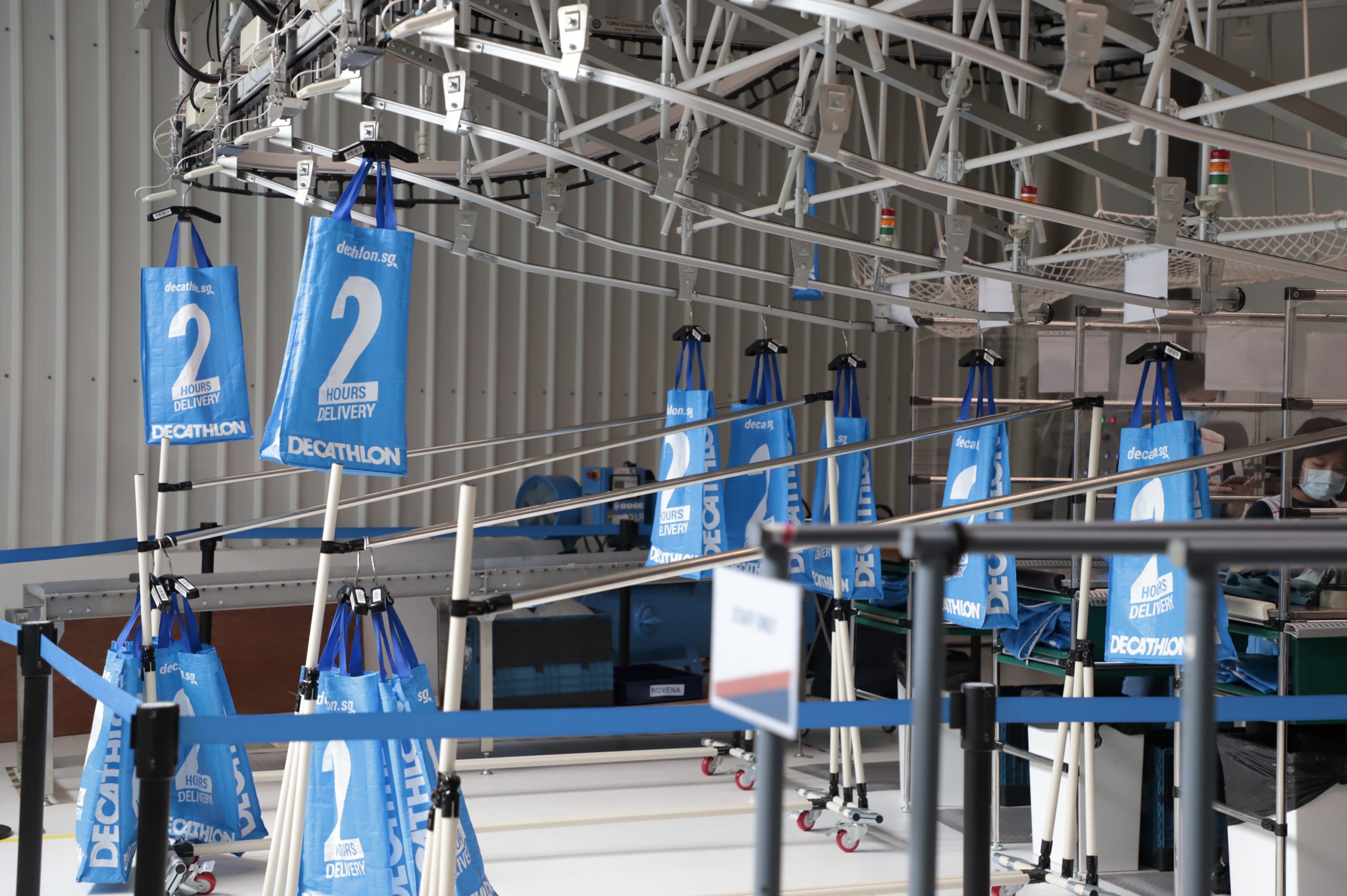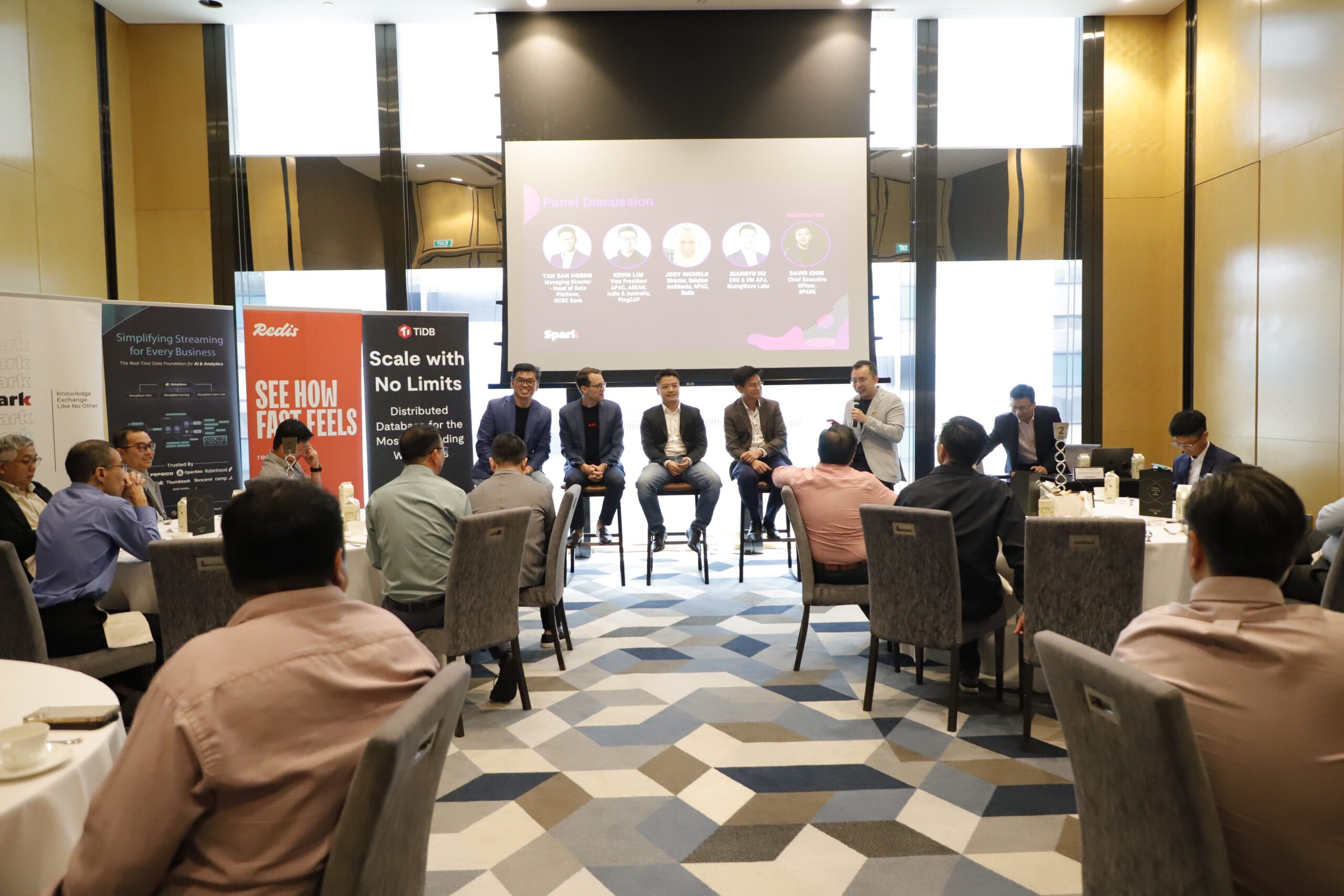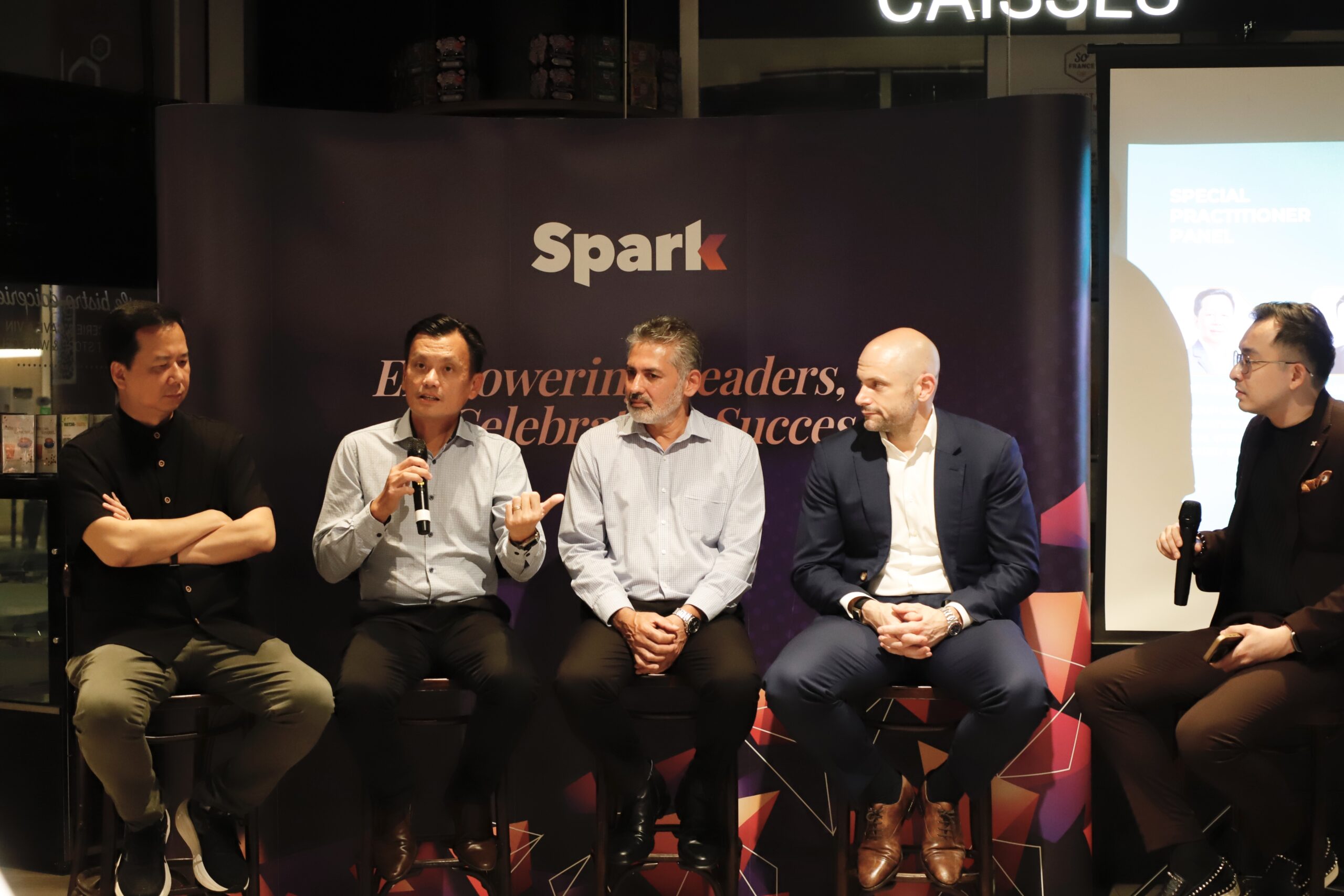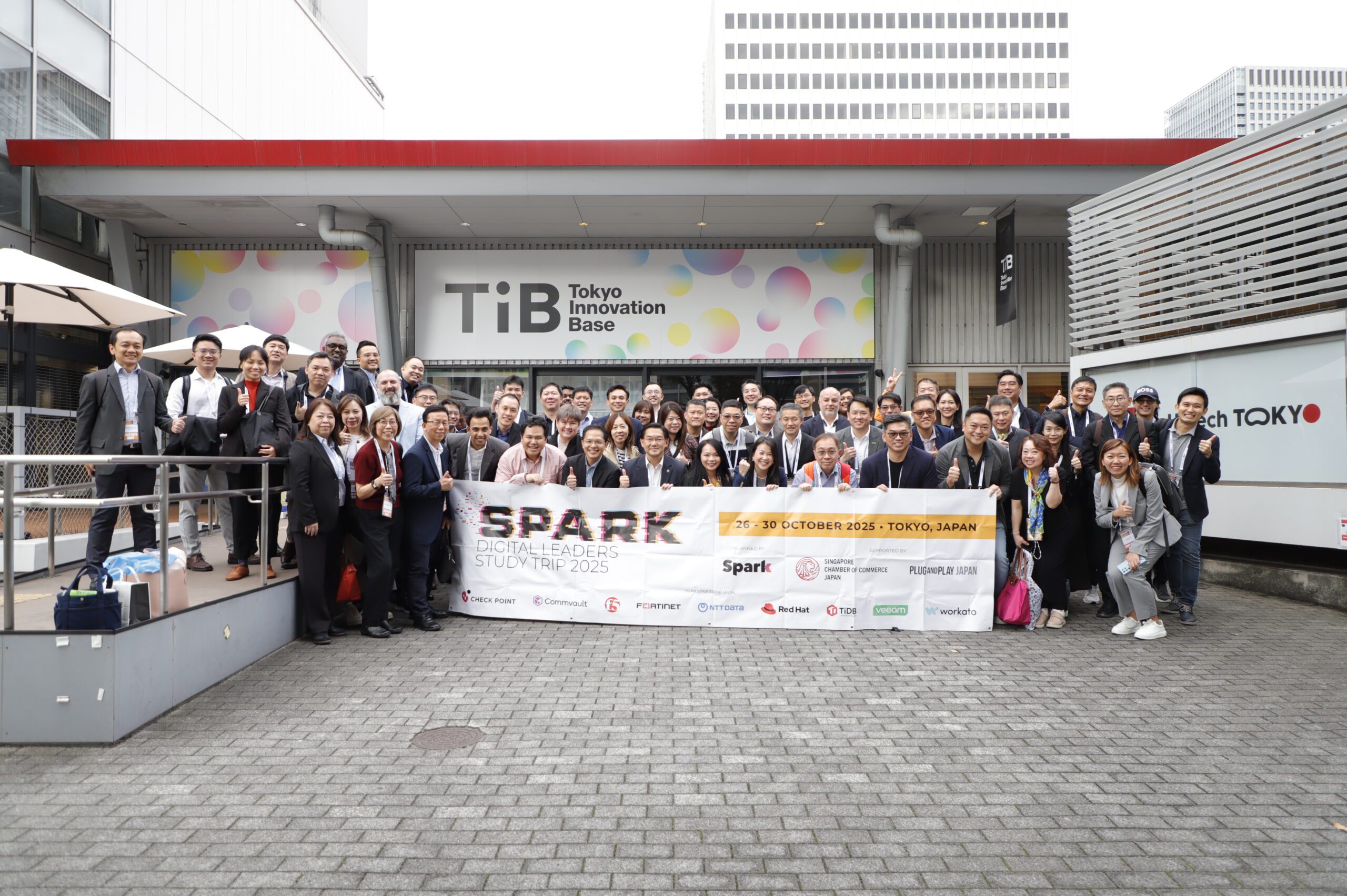CIO Academy Asia organised a tour of the Decathlon Singapore Lab on 23 April, followed by a Roundtable Discussion on “Driving Digital Transformation in the CPG sector” with some select CIOs from the CPG sector, led by Nils Swolkien, MD of Decathlon Singapore. 10 other CIOs and IT directors from the related sectors participated in the roundtable, representing some of the biggest brands in the business such as Kellogg’s, Heineken, Shiseido, Coca-Cola, Hermes, Ikea and the DFS Group, among others.
The spokesperson from Decathlon Singapore Lab gave an overview of the Lab and explained the concept behind the innovative store. This was followed by a tour and demonstration of the Lab’s haulage system, warehouse and omni channel payment system.
While the haulage system demonstrated how it linked to the logistics blueprint and how the store staff fulfilled online and offline orders with one single team, the warehouse part of the tour covered areas involving bagging, logistics and last mile fulfilment and how items were sorted and vans were dispatched to delivery centres every 30 minutes. The last part of the tour covered the cashless payments system using mobile app and the self-checkout system with RFID deactivation with QR code.
This report is based on the insights shared by the Decathlon team and other CIO participants of the facilitated Roundtable discussion.
The ongoing pandemic has had a huge impact on the Consumer packaged goods (CPG) sector, together with the retail, e-commerce and logistics sectors, not just in Asia but globally. The action has swiftly moved from offline to online, and data-driven marketing and omni-channel sales have become more important than ever.
The CPG sector is an industry term for merchandise that customers use up and replace on a frequent basis such as food, beverages, cosmetics and cleaning products.
One of the major issues that this industry has been facing is the transformation of disconnected data into actionable intelligence. It is a fact that even though most companies active in this space have increased investment in digital technology, they still operate with disorganized and disconnected product data. But if they get it right, the opportunity is huge: they can vastly improve margins and increase collaboration across the CPG supply chain.
Secondly, there is the heightened importance of agility in organizations—the ability to act rapidly on customer feedback, sense consumer demand, bring solutions to market quickly, and refine them continuously. Thirdly, deploying and engaging the right talent in an environment where certain skills and capabilities are in extremely high demand but in short supply.
Decathlon, a French sporting goods retailer, is a great example of a company which has successfully dealt with the above mentioned challenges encompassing retail, logistics and e-commerce. With over 1647 stores in nearly 1000 cities in 57 countries and regions, it is the largest sporting goods retailer in the world. The company manages the research, design, production, logistics and distribution of its products in house; partners with global suppliers; and markets their own brands directly to consumers.
The sports company recently hit the headlines in Singapore when it switched to cashless, self-checkout kiosks for all its 12 branches in the island state. Decathlon Singapore Lab, which is the flagship store of the company, set up in January 2019, showcases the capabilities of the retailer through the power of digitalization. It also offers a glimpse of the shape of things to come for the retail sector.
Located in Kallang, Decathlon Singapore Lab is a vibrant and innovative sports hub where all Singaporeans can enjoy an amazing sport experience and choose from 1100 free sports classes. The Lab is open to the public, who can come to discover new technologies of retail and interactive test zones at this 5,000 sqm facility.

Working as the e-commerce hub of its island-wide operations, the store fulfils 55% of the e-commerce sales, of which 20% is pure online orders and 20-30% are offline orders. 800-1000 orders are fulfilled everyday under two schemes: Click and Pick (3-4 items delivered within 2 hours to a chosen store location) and home delivery within 24-48 hours for a fee. Orders are collected and dispatched every 30 minutes to delivery centres from the Lab.
Reimagining the store
In the past couple of years, there has been a gradual shift in consumer behaviour. In the age of smartphones and popularity of e-commerce, established brand names mean much less to consumers than they used to. The pandemic has further reinforced this trend.
According to McKinsey, ‘the basis of retail competition has shifted from price and product superiority to privileged insights and customer experience. Because of this shift, the new reality is that while physical stores can still be highly effective consumer touchpoints, retailers need to think hard about the role of the store. Stores must be tightly integrated with the online channel, enabling online sales while simultaneously offering experiential features and cutting-edge technology that sets the store apart’.
This is exactly what Decathlon Singapore Lab has done, setting an example for other retailers and players in the CPG sector. And there’s a compelling story behind its genesis.
The Wakeup call
Nils Swolkien, Managing Director, Decathlon, said that the store has nearly 20 years of presence in China and it was a fantastic story of growth. Starting in 2003, the company opened about 300 stores in China. But 3-4 years ago, he realised that customers were not coming to the store. The digital wave had disrupted the market in China, where ghost malls were becoming a common sight. A significant shift had taken place: 90% of customers had gone online.
 This was a wakeup call for us, said Swolkien. “Merely having a product was not good enough any longer to get customers to your store,” he said. “You now had to provide a unique experience to attract customers.”
This was a wakeup call for us, said Swolkien. “Merely having a product was not good enough any longer to get customers to your store,” he said. “You now had to provide a unique experience to attract customers.”
Being social is part of human nature–so Decathlon realised that they would have to build their stores by emphasizing the humanistic value of the business.
Selling Experience, not just products
The Decathlon Singapore Lab was built keeping this experiential aspect in mind. According to Swolkien, the aim was to make the customer come back to the store to have a great experience. That’s why, working in tandem with the Singapore Sports Council, the Lab offered 1100 free sports classes including yoga sessions. The organization wanted to appeal to all age groups including the kids, women, and the elderly. For example, to entice the elderly, they started Tai chi classes, and it proved to be a great success with that age group.
In this way, Swolkien’s team transformed the store into a hub of healthy living, so much so that they made healthy food available to their customers at the in-store cafe (Simply Wrapps). The company also made sure that the food on the menu must be cheaper than other fast food outlets–clearly demonstrating their health conscious approach.
Cashless, but no one is excluded
One criticism of businesses going cashless is that it may exclude the elderly customer segment. Swolkien said that every customer in the store is a friend and family for the staff, so in cases of cash transactions, staff members provide personal help for the customers. Staff may pay using their own cards and accept the cash from the customers.
The Customers pay for the tech
To build a cashless store with experience as the main attraction requires a lot of tech behind the scenes. For the Decathlon Singapore Lab, the tech was developed in-house by Swolkein’s own tech team. Interestingly, the customers paid for the tech investments –by using the Decathlon app widely and purchasing products through it. The app was developed in 10 months and about 300,000 customers have downloaded it.
 Lessons from the Lab: Some Learnings
Lessons from the Lab: Some Learnings
- Don’t waste money by investing in unnecessary items in your store. For example, having display screens to browse items in-store is not essential. The only screen customers are interested in are their own personal screens. So, don’t waste resources in erecting fancy screens in the store, it may end up being white elephants.
- Showcases must be physical but buying should be digital.
- Brand success is important in driving sales. Sales can go up or down but make sure the brand is loved by the customers.
- Agility is important for digital transformation: make sure you work smart and realise your dream in weeks, not years.
- The only KPI that matters is that today’s performance should be better than yesterday’s. Don’t chase perfection; it is the enemy of good.
- Stay curious (ask questions) and be pragmatic
- Adapt or die! When you see ghost malls, ask yourself: Do you want to go there?
- When you set out to do anything new or make any change, always start with ‘why’.







